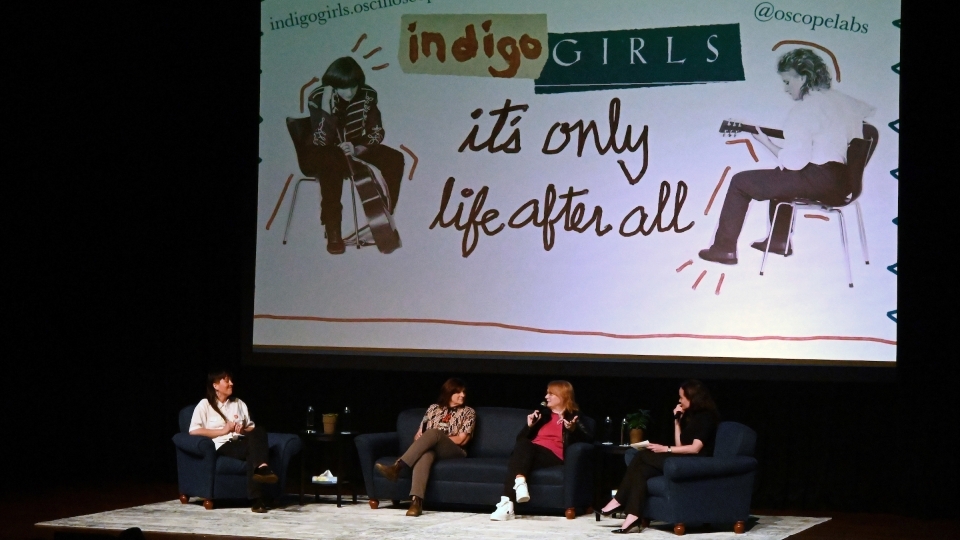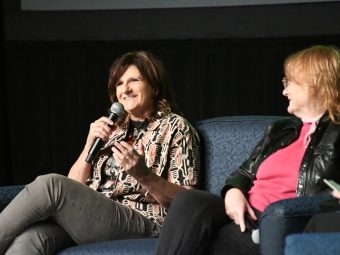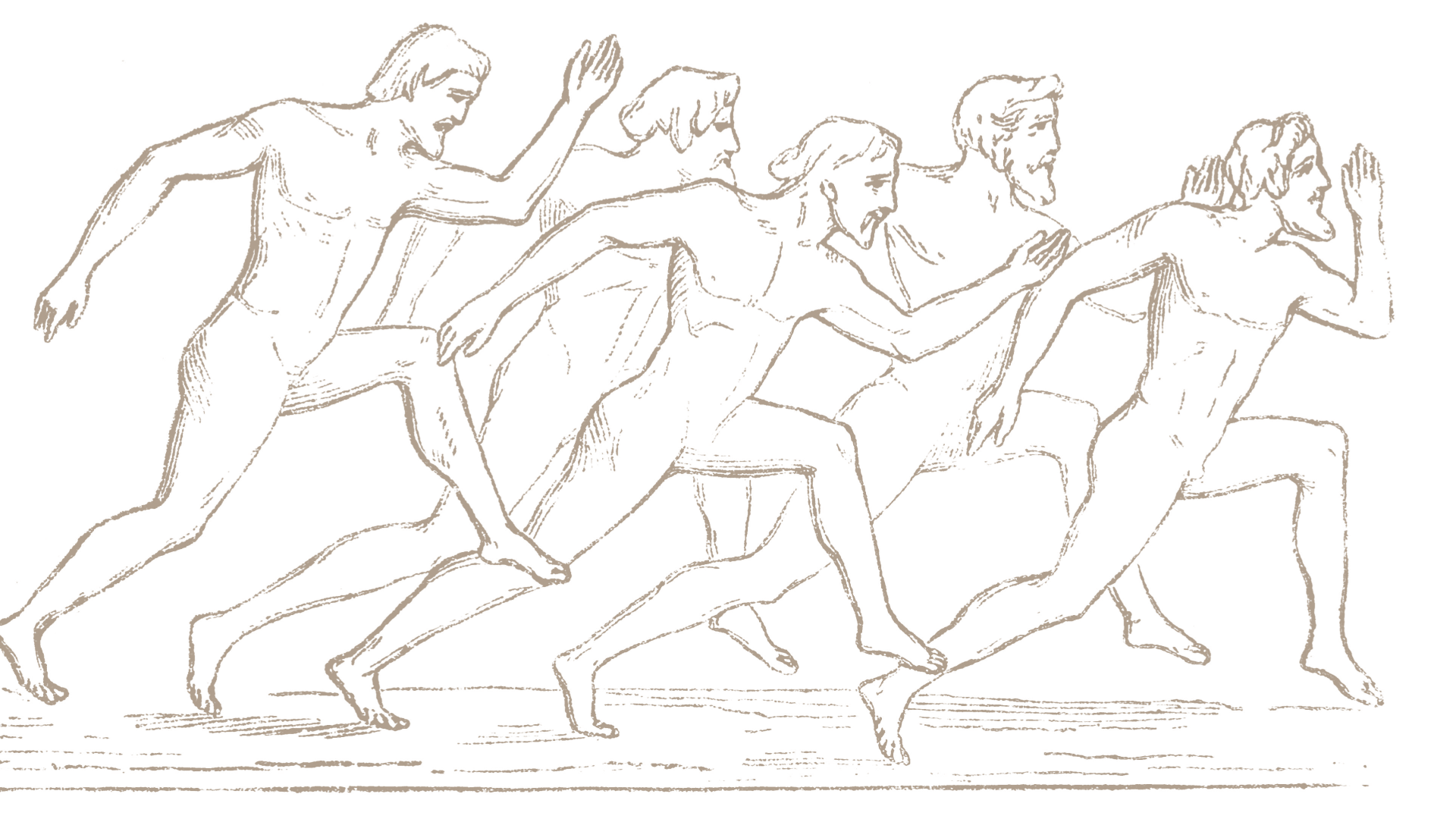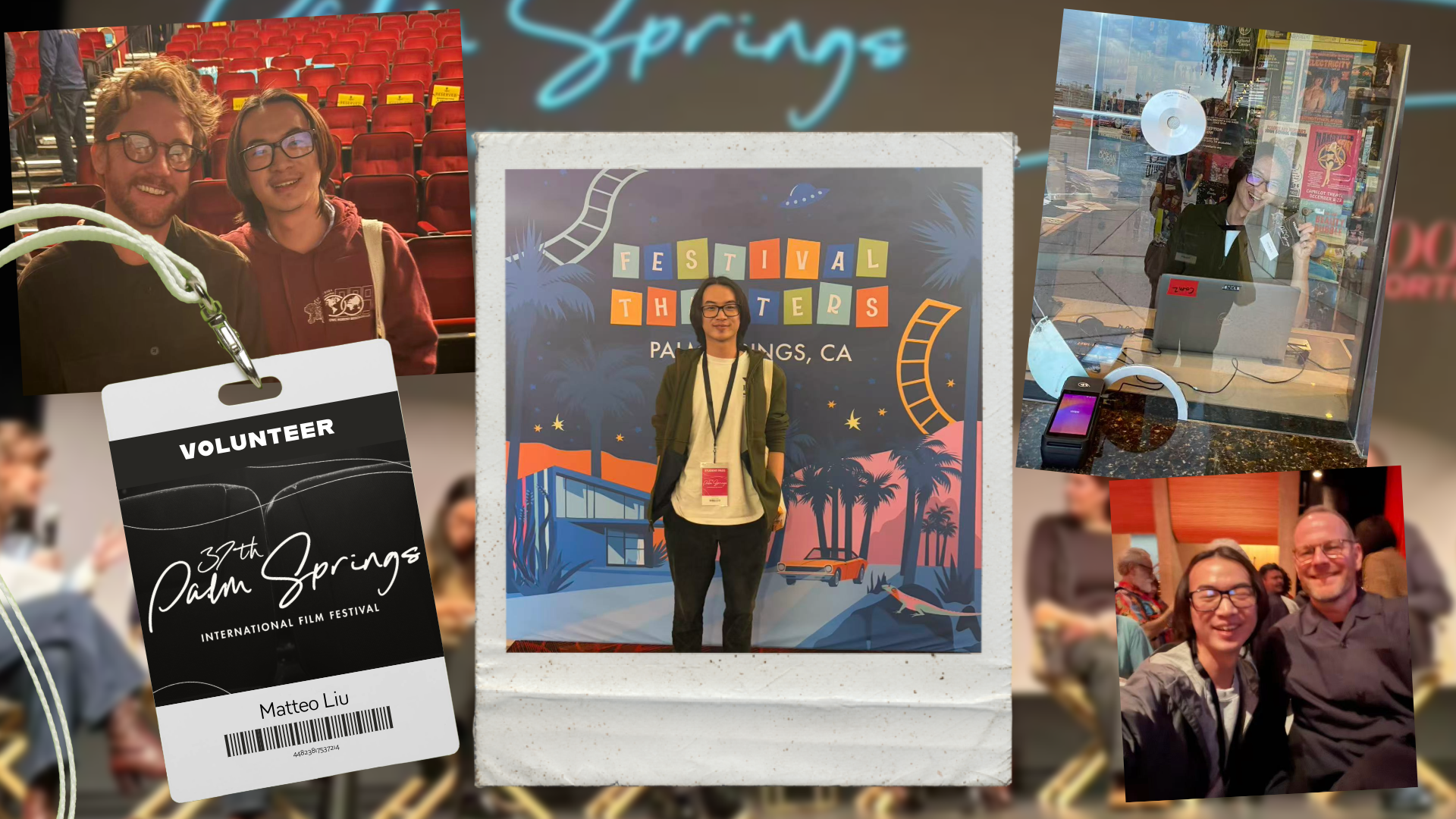The Power of Two: Documentary, Chat With Indigo Girls Inspires Across Generations
April 26, 2024
- Author
- Lisa Patterson

Director Alexandria Bombach, Indigo Girls Amy Ray and Emily Saliers, and moderator James K. Batten Professor of English Emily Drew ’04, on stage at Davidson College for a discussion following the screening of It’s Only Life After All.
It’s 1998 and Yancey Fouché is jazzed. The Indigo Girls, Emily Saliers and Amy Ray, are set to play a free concert at her suburban Tennessee high school — the luck! At the last minute, the principal cancels the concert citing reports the duo had used a particular expletive at a recent concert. Soon after, before a scheduled South Carolina concert, parents complain and the school board gets involved — the board chair accuses the musicians of “promoting an agenda.” Another concert canceled.
Fouché, now director of sustainability at Davidson College, recalls that incident before a special campus screening of the documentary It’s Only Life After All, the Sundance Film Festival darling and recent New York Times critic’s pick. She is one of countless faculty, staff and students touched by the duo’s music and advocacy throughout their 40-year collaboration.
Because of mentors who believed in them, because of their friendship, because of the support of family (born and chosen), because of the music, they outlasted those South Carolina and Tennessee moments — very public moments of homophobia and misogyny that played out in the media and in the quiet course of everyday life.


They’ve also drawn upon those experiences to inform their music and advocacy on behalf of organizations that focus on education, community building and justice. They are co-founders (with Native American activist, economist, and author Winona LaDuke) of Honor the Earth, a non-profit dedicated to the survival of sustainable Native communities, Indigenous environmental justice, and green energy solutions.
The documentary, recently called “warm” and “compelling” by The New York Times, the same outlet responsible for panning a 1989 live show, shines a light on that lesser-known aspect of their creative partnership while carving a portrait of singular talents who make equally singular art together. It tracks their lives and career through interviews and 1,000-plus hours of footage, more than 700 from archival footage collected by Ray, spanning the duo’s high school days to the present.
Davidson students, faculty and staff attended a free showing of the film Thursday night, ahead of their April 26 concert at the new Davidson College Stadium. A discussion with the Indigo Girls and the film’s director, Alexandria Bombach, moderated by James K. Batten Professor of English Emily Drew ’04, followed in the Duke Family Performance Hall.
The discussion started with a surprise — Saliers’ father joined President Doug Hicks ’90 for the screening. He got a shout-out and round of applause at the start of the post-movie discussion.
“My dad and I are very close, we’re like friends really. But he’s a scholar and a theologian — he taught theology at Emory, so I learned so much from him,” Saliers said. “His favorite poets are Mary Oliver and Emily Dickinson, so we get together and we talk about poetry and he helps educate me about all these interesting things that have to do with religion and history and faith. He’s always been surrounded by women, so he’s quite the feminist.”

Teachable Moments
More than 15 courses from disciplines ranging from environmental studies to music to gender and sexuality studies to English incorporated the documentary into syllabi this semester.
Students born around the turn of the millennium watched and listened with their professors, some who are contemporaries of the Indigo Girls and some who consider their music part of the soundtrack to their formative years.
“I appreciate that the Indigo Girls have been willing to take a stand on so many social issues over the course of their long career — feminism, sexism, environmental justice, Native American rights, and have done so poetically, beautifully,” said Angela Willis, professor of Hispanic Studies and Latin American Studies. “Their songs have a way of reaching and speaking to a wide, diverse audience. As a child of the 1980s, I have long admired their musical sincerity.”
Willis’s Spanish composition and conversation class, “Activism in the Arts,” studies multiple forms of artistic expression — documentaries, poetry, street art, painting — to understand how art reaches people and moves them to act.
“The music and activism of the Indigo Girls serve as concrete, relevant and powerful examples of what we have studied,” she said. “I believe the film (and concert) will help to cement what we have explored.”
Julie Davis ’27 had heard of the Indigo Girls because her mom is a fan, but she knew nothing of their social justice work. In the documentary and discussion, she found closer connections to the themes in Willis’s course than expected.
“Their work with indigenous communities to inspire environmental and social justice was particularly relevant. For our final research paper, I chose to investigate the impact of art on rainforest preservation and human rights in Colombian indigenous and Afro Colombian communities,” she said. “Though Colombian groups certainly differ from the communities the Indigo Girls work with, I found it fascinating how both movements incorporate voices and perspectives of individuals who are typically silenced. As they described in the documentary, activism is much more effective when individuals collaborate with existing efforts to strengthen their work, rather than trying to combat issues with external solutions.”
Physics Professor Dan Boye’s “Music: Sound with Impact” course examines the science behind how sound is produced, recorded, and played back, as well as how music impacts so many areas of our individual and communal existences. Just recently, students attended Opera Carolina’s production of Turandot.
“Coming off of that experience, this week’s Indigo Girls events add another layer,” he said. “In addition to hearing the Indigo Girls’ artistry and inspirations behind their journey, I want the students to experience the DFPH with their new, scientifically inquisitive eyes and ears. The acoustics change quite a bit from a vacant sound check to a fully crowded room. For the concert, we will all be experiencing a new venue. How well will the amplified sound be setup and how successful will the audience hear and understand what they see happening onstage?”
Boye studied physics and classical voice at the University of Georgia at the same time the music scene in Athens, Georgia, exploded, with bands including B-52s, REM and Indigo Girls honing their craft in local clubs. As a grad student going to their live shows, Boye appreciated their “intricate harmonies” and “clean accompaniment;” alone in the laser lab, he cranked up “Closer to Fine.”
“I suppose I’m known around campus as the singing physicist whose primary focus is classical voice,” Boye said. “I want students to know that I respect and love that we can make expressions beyond words through music of all kinds.”
Katie Horowitz, professor of gender and sexuality studies, calls the Indigo Girls trailblazers.
“Today, with so many openly queer artists making music about queer subjects, it’s easy to take for granted the important role that LGBTQ people play in the music industry and the fact of LGBTQ representation therein. But just 10 or 15 years ago, this was not the case,” she said. “I hope that students will come to understand what it was like for previous generations of queer people, especially lesbians, to see themselves represented in popular music when there were so few out musicians.”
As someone who came of age at time when there were few queer role models in popular culture, Horowitz found recognition in their music.
“I could see myself in them and in their music,” she said. “It’s hard to quantify just how meaningful that was.”
Luke Watson ’24, a musician and self-declared big music fan, attended with English Professor Suzanne Churchill’s “Modern Poetry and Politics” course.
“I really appreciated how the film showed intimate portrayals of Amy Ray and Emily Saliers without letting those moments overshadow the community and importance of the band. I feel I got to know both of them extremely well, but the film wove the duo’s widespread impact into the personal stories of the two,” she said. “As a musician, I admired the honesty of both the duo and the filmmakers; they were willing to show how the company you keep and community you create is just as important as the art itself. Their past doubts about their creative abilities and identities resonated deeply with me.”
The Indigo Girls return to Davidson after 35 years a little older and wiser, but with the same power to create community and inspire change, hallmarks of their longstanding partnership.
“While the concert will be a terrific community gathering, the even more extraordinary and enduring moment for Davidson occurred when two talented musicians gave their time to talk with our students,” President Hicks said. “At Davidson, we are about educating humane leaders to address global challenges. Emily and Amy are genuine examples of what it means to put values into action over a lifetime.”



